Popular on Food52
Continue After Advertisement
56 Comments
J
January 17, 2024
I just love beans! In Winter (which lasts a very long time and is very cold where I live), I do eat beans—heirloom fresh beans from my Bean Club— every day (in Summer I can barely keep up with my CSA and Farmers’ Market addictions). In the last 6-7 years, my Instant Pot has really revolutionized my bean cookery: its easy, countertop pressure cooking makes the cooking not just fast, but reliable in terms of time and texture. Although a big pot of beans simmering on the stovetop is divine, I love not unexpectedly waiting 3-4 hours for a bunch of beans to finish cooking. With the IP, it’s easy for me to cook a pound of beans from dried at least once a week.
Cleve H.
October 13, 2016
I cook beans all the time and rarely pre-soak; however just as with grains, after simmering until tender, I always allow beans to rest. I turn off the heat and leave the pot covered for 15 to 45 minutes without peaking. Then I stir and reheat to a simmer. In this way, the beans have time to absorb more moisture and become creamier inside without being crushed by excessive simmering and stirring. Try it. I think you will find that this really is one secret to a good batch of beans.
Ilana K.
October 12, 2016
I cook beans weekly in my slow cooker. No soaking or monitoring of any kind needed and get perfect beans every time. I do add 1/4 tsp baking soda when cooking garbanzo beans because they seem to be the most challenging. We love beans!
trampledbygeese
July 29, 2016
Really great article. A couple of words in favour of pre-soaking the beans. One school of thought is that pre-soaking actually begins the germination process, thus converting the sugars and giving the beans a different nutritional profile which makes it more digestible for many people. Think sprouts! To take advantage of this, the beans need exposure to oxygen during the soaking process. One can do this by changing the water or simply stirring the beans every few hours. Another advantage is that pre-soaked beans can cook much faster, cutting down on time and fuel costs, making beans even more affordable. Of course, sometimes one just needs to cook beans from dry. The kombu is a great tip and I can't believe I forgot it.
Joan C.
July 31, 2015
One piece pf advice for people living with very hard water..either use filtered water or use a 1/8-1/4 tsp baking soda. Even with soaking beans can have difficulty softening when the water is very hard. Also Rancho Gordo beans are wonderful!
Betty J.
April 19, 2015
Thirscfeld--my partner has jars of ajwain which he uses for tea daily; he says it is for his stomach.
Betty J.
April 19, 2015
I cooked my Eden Organic Black Beans in a slow cooker. Unsoaked , I put them in before I went to work and a quick check when I returned (and that's when I salted them) and let cook for another hour or so. The most delicious beans I have ever made.
Halli
August 15, 2014
Trampled, there are two common methods for soaking beans: 1) let sit in room temp/cold water 8 hours/overnight; or 2) bring to a boil, cover, and turn off the heat, and let sit for an hour. However you soak them, they'll need to be cooked, in fresh water, for 1-1 1/2 hours, depending on type of bean.
trampledbygeese
August 11, 2014
Great article. I'm just learning to love beans myself. I keep buying them but too cowardly to cook them. Today I'm christening my new bean pot.
A question about soaking the beans. My mother use to use boiling water, but all the recipes I read say we should soak with cold or room temp. Is there any benefit to using boiling water?
A question about soaking the beans. My mother use to use boiling water, but all the recipes I read say we should soak with cold or room temp. Is there any benefit to using boiling water?
Janey
April 30, 2014
Beans are my favorite food, endless ways to serve them. A Colorado company Love Grown Foods just introduced breakfast cereal made from beans. Power O's. Now I can literally have beans at every meal!
John R.
November 3, 2013
"Beans may not be a fruit..." Yes, they are. From the Mayo Clinic: "According to botanists (those who study plants) a fruit is the part of the plant that develops from a flower. It's also the section of the plant that contains the seeds. The other parts of plants are considered vegetables. These include the stems, leaves and roots — and even the flower bud. The following are technically fruits: avocado, beans, peapods, corn kernels, cucumbers, grains, nuts, olives peppers, pumpkin, squash, sunflower seeds and tomatoes. Vegetables include celery (stem), lettuce (leaves), cauliflower and broccoli (buds), and beets, carrots and potatoes (roots)." Please help stop the misconception that beans are not fruit.
trampledbygeese
August 11, 2014
Great info. I'm glad to read it. Though I wonder... The English language isn't always that accurate when classifying things like beans. From a botanical point of view, what you say makes absolute sense. However when we look at the food triangle that the government loves to teach, beans are considered a "meat and alternative" (at least in Canada). In the vernacular, many people differentiate between fruit (as sweet), vegis (as green/savoury/fresh) and pulses (as in dry beans). Maybe since this is a food site talking about both ingredients and 'foods', it's good to include several definitions to avoid this kind of equivocation.
Halli
October 28, 2013
I've been following directions I'd seen before for instead of overnight soaking, bringing them to a boil, covering the pot, and turning off the heat for an hour. Then you drain and rinse them and add fresh water to cook them for 1 1/2-2 hours. I'm very happy with this method.
JohnSkye
October 27, 2013
there are lotsa articles on whether adding a "pinch" of baking soda during the cooking process 1) aids in digestibility or 2) helps the beans cook faster ... not sure about either, but i do find that adding an 1/8 tsp of baking soda (per pound) to black beans does help them stay blacker, i.e., helps prevent them from turning into "dark gray" beans.
cybrcook
October 24, 2013
From Indian cuisine, I "cook" any spices I add to my soups in a bit of oil, then add to the soup liquid. This prevents spices from tasting "raw". The spice/oil combination can simply be warmed in the microwave before adding--
RanchoGordo
October 17, 2012
If you eat beans once in a blue moon, I can see where the gas issue comes in. A big bowl of chili after a low-fiber diet is going to give you what we in the business call a "gift with purchase".
If you eat beans, know your source and they are fresh (less than 2 years), it really isn't an issue for most of us. I love Julia but really, I'd rather eat Diana Kennedy's beans than hers.
If you eat beans, know your source and they are fresh (less than 2 years), it really isn't an issue for most of us. I love Julia but really, I'd rather eat Diana Kennedy's beans than hers.
Jan S.
October 24, 2013
Sando's slow bubble is the best way to cooks beans. I never soak Rancho Gordo beans, they are perfection season after season.
Mr B.
October 17, 2012
The esteemed Julia Child determined the best way to reduce the GI effects of beans... she called those effects the "rooti-toot-toots." She recommends soaking each pound of beans in at least six quarts of water for, at a minimum, overnight. Drain the beans next day and use your recipe of choice to cooks the beans. Use fresh water, NOT the soaking water. Mme. Child even addressed the assertion that "soaking actually draws nutrients and flavor out of the beans" Her advice: "eat a marginally larger helping of beans." What's not to like?.
veganamericanprincess
October 12, 2012
I like your suggestion of cooking beans with bay leaf, onions, garlic and herbs; but I use a 4 inch piece of Kombu to cook my dried beans.
anntruelove
October 12, 2012
My family eats a lot of beans, especially black beans, and we always use the crockpot to make them. I put a pound of black beans with some onion, unpeeled garlic cloves, salt, and bay leaves (and of course water) in the crockpot before going to bed and they turn out perfect every time. We eat them first thing in the morning with a dollop of sour cream or plain greek yogurt topped with shaved parm cheese for a delicious and filling breakfast.
saltybutter
October 10, 2012
I'm not a soaker because I'm a slacker.... I make beans (usually black) once a week and never soak them. I like to throw in 2 bay leaves and salt them once they've started to soften. My kids love black bean tacos but I just like them in a bowl with hot sauce.
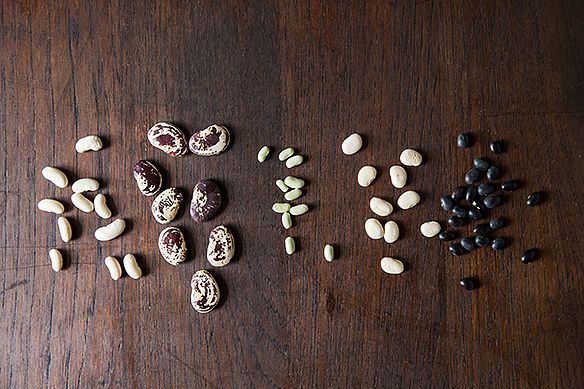
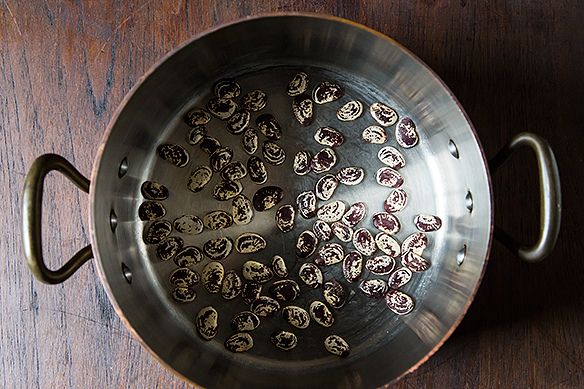
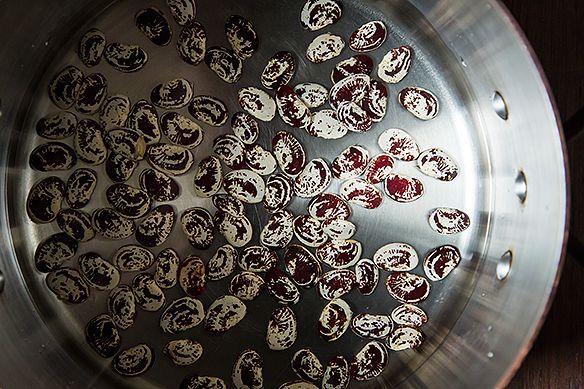
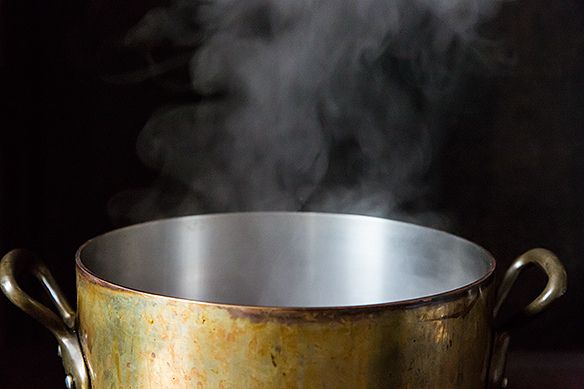
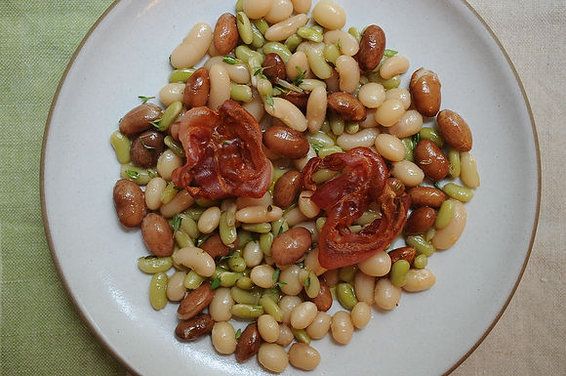
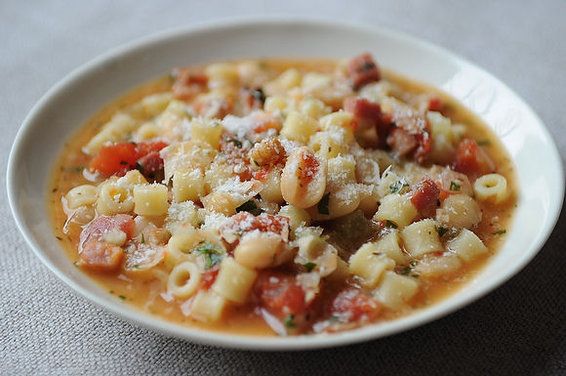

See what other Food52 readers are saying.